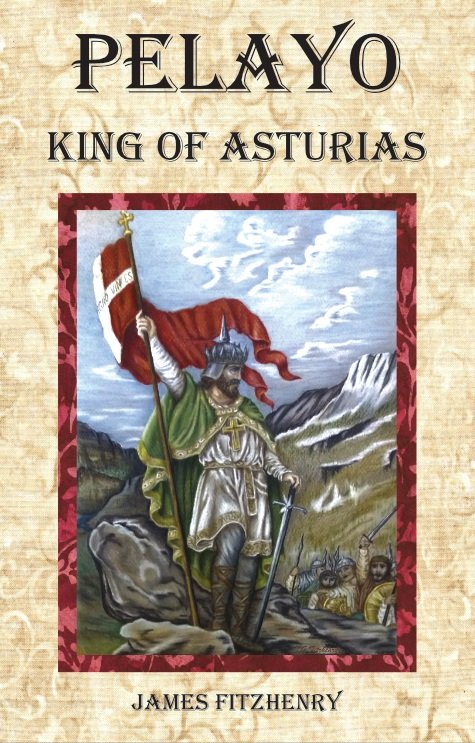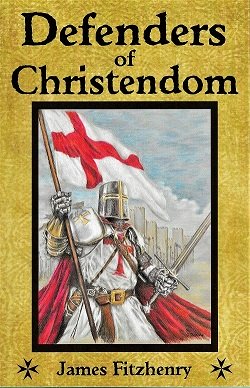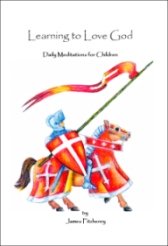El Cid Campeador, Rodrigo Diaz
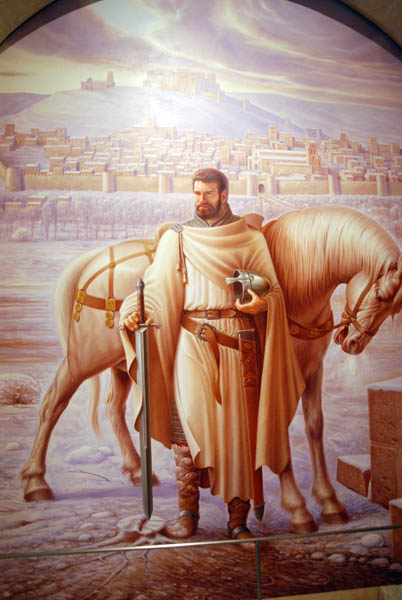
Rodrigo Diaz de Vivar was a Spanish knight born in the year 1043, and he is the national hero of Spain. He is perhaps more widely known as “El Cid Campeador,” (El Cid meaning The Lord, or Master, and Campeador meaning The Champion, an honorable title rarely given to a man during his lifetime).
Once he became a knight, Rodrigo soon distinguished himself in such a manner that he was appointed to be the commander of the Castilian army under King Sancho II. Rodrigo proved himself in several battles in which the Castilian army was always victorious under his capable leadership, and it was during this time that he earned the title El Cid, as well as the honorific title of Campeador.
King Sancho was murdered in 1072, and his younger brother, Alfonso, came to the throne. As it was widely suspected that Alfonso was responsible for Sancho’s death, Rodrigo made him publicly swear an oath that he had nothing to do with his brother’s death before he would acknowledge him as his king. In a very dramatic scene, Alfonso swore that he was innocent of his brother’s blood and was thus accepted as king of Castile. Even though the oath had gained him the willing acceptance of his vassals, King Alfonso held it against the Cid that he had publicly challenged him, and so at the first opportunity he unjustly exiled Rodrigo from Castile.
Buy your copy of El Cid, God's Own Champion now for only $22.95 US plus shipping
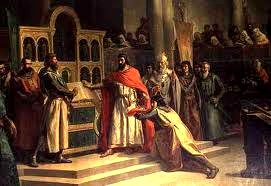
Rodrigo, forced to leave his family behind, crossed into the no-man’s land with 300 of his faithful vassals. Earning the enmity of King Alfonso for assisting the Cid, Rodrigo’s companions swore their fealty to a lord who no longer owned any lands or possessions. Like the Cid, they left titles and property behind to endure to a life of wandering and uncertainty. With these few men Rodrigo accomplished many magnificent deeds, surviving by his ability as a general and his skill at arms, until he eventually conquered the city of Valencia.
The great Almoravid invasion of the Iberian Peninsula occurred in the year 1086, and King Alfonso was soundly defeated by the Muslim army. As time proved, King Alfonso was simply not capable of defeating the Muslim general Yusuf. There was only one man who could defeat him, and that man was the Cid, but King Alfonso continued to do his utmost to try destroy him. His personal excellence incited envy in those who were not so blessed by God, and there were powerful men who hated and calumniated him. In face of this blind, malignant envy, the Cid showed neither discouragement nor rancor. When exiled, he sought no direct vengeance, however much he was entitled to do so; nor did he, like Achilles, sulk in his tent and hope for the defeat of his detractors. On the contrary, he repeatedly went to the help of the King who had exiled him and, in spite of a series of rebuffs from his countrymen, took the only dignified course left open to him; he withdrew his invaluable energy to a distant field where envy and mortification could not reach him, but where he could still so-operate, whether they wished it or not, with his backbiters.
Rodrigo eventually faced the Almoravids in battle and defeated them at every turn. He was also forced at times to fight against other Christian armies that attacked him, usually for reasons of personal envy, but Rodrigo also defeated those armies. By the time of his death of natural causes on July 10, 1099, he commanded the respect even of his enemies, as his ability as a warrior was so extraordinary that upon his death a Muslim historian acclaimed him, “a miracle among the great miracles of the Almighty.”
Many tales were told throughout Europe about the days of the Cid, and the events of his life were remembered and celebrated long after his death. This is not surprising, as he was a knight who was never defeated under any circumstances, in any situation, by any man, or any group of men.
As an epic hero, the Cid stands in a class by himself. His deeds while in exile were mighty. Consider, for instance, Rodrigo’s triumph over Valencia. It savors of madness that a single man, unsupported by any national organization and lacking resources even for a day, should appear before Valencia determined upon restoring a rule that had been overthrown this second time by an enemy who had proved irresistible to the strongest power in Spain; that he should dream of doing what the Christian Emperor had failed to do, and in the teeth of the Moslem Emir’s opposition that memorable day in October, 1092, when he pitted his will-power against all the chances and changes of fortune, marks the zenith of heroism. The Aragonese historian, Zurita, wrote: “…it was the most extraordinary achievement ever performed in Spain by anyone but a king.”
The Carmen Roderici, a story of the Cid’s life, was begun during his lifetime, and the Poem of the Cid was completed soon after his death. They emphasize in their simple language his qualities in war and the extraordinary powers of one who solely by the strength of his mighty arm rose from the condition of a persecuted knight to be the most powerful man on earth who acknowledged a king.
In fulfilling his duty for the love of God, the Cid conquered many enemies, and is justly immortalized as one of history’s greatest heroes.
- Excerpt from the book “El Cid, God’s Own Champion”
“The clash began as the Africans went about the city pounding their oppressive drums, while shrieking and shouting and filling the air with their bellowing as they fired huge numbers of arrows at Rodrigo and his men. The sound of their drums seemed to rend the earth asunder.
Rodrigo, stout of heart as ever, comforted and strengthened his troops in a manly fashion and constantly prayed devoutly to the Lord Jesus Christ that He would send divine aid to his people. He knew now how he might defeat the enemy, but he would have to hold on for awhile to do it.
There had never truly been any doubt in Rodrigo’s mind about the outcome of battle, for when he saw Jimena pale with fear upon hearing the Almoravide drums for the first time, he told her that in two weeks he would lay them at her feet, and then make them a votive offering to the Blessed Virgin Mary.
Day after day the conflict went on in a similar manner with the Africans making attacks on the city, and each day the fighting was renewed with unabated vigor, but everywhere the dauntless Cid was to be found, encouraging his men, in the words of the Christian chronicler, by the natural fortitude of his heart and urging one and all to keep on praying to the Almighty for help. The Cid remained on the defensive for ten days, never once making any kind of assault against the Africans. By this time the Almoravide were convinced that they had Rodrigo frightened and completely intimidated into inaction, and so finally committed their entire force to a ground assault against the city.
This was the opportunity for which Rodrigo had been waiting.
Suddenly one of the gates of Valencia opened wide, and there for a moment the massed Almoravide looked upon a single knight mounted upon a great warhorse.
Who he was they soon learned, as he raised his lance and shouted, “In the name of the Creator and the apostle St. James, smite them, O knights, with right good will! For I am Rodrigo Diaz, the Cid from Vivar!”
To the fierce cry of “St. James and at them!” the Christian knights erupted from the gate with almost berserk fury…”
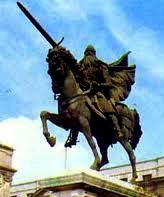
https://youtu.be/mDsVUG974TE
https://youtu.be/mDsVUG974TE
Reviews for "El Cid, God's Own Champion"
Catholic Family News
El Cid, God’s Own Champion
reviewed by Colleen Drippe
History. Battles. Strategy. Here is a book that throws some light on Spain's dark ages – the maturing of the Visigoths. El Cid, born Rodrigo Diaz, was the great Spanish hero of the eleventh century. This was the century of the First Crusade to the Holy Land, but Rodrigo Diaz was fighting his own crusade, saving the threatened northern half of the Iberian Peninsula from Moslem domination. It was not until nearly 500 years later that the last of the Moors were expelled from Spain by Queen Isabella the Catholic, but neither Aragon nor Castile would have continued to exist as Catholic kingdoms had it not been for El Cid.
This is a book of action filled with battles, strategies, betrayals, and sieges. But it is also a book of values – timely values indeed. Loyalty, hierarchy, duty, perseverance, and plain, raw courage. The Cid defended faithfully a weak and treacherous king because the king was his feudal lord. He dealt with innumerable Moslem leaders, and himself became an overlord with many people's welfare in his keeping. He filled each role, fulfilled each duty to the best of his ability, and still shines as an example to the men of our time.
He lived in a time when "the presence of God and His saints was still keenly felt... [while] ...the man of the modern age is materialistic ... [seeing] nothing outside of the physical senses." (El Cid, page13)
"The Catholic of Rodrigo's time ... had no such disorder in his thinking. [He knew] that all authority comes from God, and that how one exercised that authority would be something for which he would someday be answerable to God." (El Cid, page 13)
Mr. Fitzhenry has presented a hero to us and to our children – a hero who personifies the noble and timeless Catholic mind, a hero who lived a life of duty in chaotic times and who exemplifies those qualities we must practice in the moral and physical chaos of our own times. Our very civilization is at stake – as was that of eleventh century Spain. We may not be threatened with the literal sword, but we are threatened. And who will be our Cid if we do not give our sons heroes to imitate?
Highly recommended for about seventh grade through adult, the book comes with a glossary and bibliography as well as several maps and very good illustrations done by the author and his children.
Gloria Romanorum Book review
Catholic commentary, late Roman history, homeschooling, politics, and more!
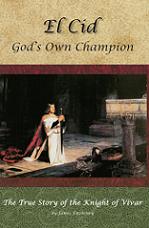
I'm embarrassed to admit that I have almost no knowledge of Rodrigo Diaz of Vivar, known to history as El Cid, the national hero of Spain. In this, sadly, I suspect I'm not alone among Americans. Thus, I was happy to receive El Cid, God's Own Champion: The True Story of the Knight of Vivar, a new book by James Fitzhenry.
The book is a historical narrative, meant specifically for older kids, perhaps ages 12 and up. It is well written and Fitzhenry's prose has an easy grace that flows well and keeps the reader's attention. Based mainly on Ramon Menendez Pidal's work, The Cid and His Spain, the text chronicles the amazing life of El Cid and gives a glimpse into a time when the threat of radical Islam was even more immediate and dangerous than it is today. The Iberian peninsula in the 11th century was rent with conflicts between the various petty Christian and Islamic principalities, and it was not uncommon for Christian nobles to ally with Islamic ones against other Christians--and vice-versa. Into this confusing morass enters El Cid, an unconquerable hero who accomplishes what seems impossible with the barest handful of men. In this he reminded me of the late Roman hero, Belisarius who found phenomenal military success against similarly daunting odds.
But El Cid's successes provoked the jealousy of his rivals who had the ear of King Alfonso of Castile. Time and again, Alfonso punished and exiled his greatest champion, but through all the injustice, El Cid remained unwaveringly loyal, ever seeking to win back the good graces of his sovereign. In this, too, El Cid's story echoes that of Belisarius who was also unjustly slandered by jealous rivals and who suffered, as a result, the suspicion and punishments of his master, the Emperor Justinian. Of course, the difference is that while Hollywood has made an epic version of the life of El Cid, it has not yet done so for Belisarius. Perhaps this is for the best, however, given what Hollyweird has become these days.
Fitzhenry also portrays El Cid as a paragon of Christian manhood. He is honest to a fault, pious, and humble before his king. He also shows mercy to his enemies and repeatedly tries to win the allegiance of the faithless Muslims of Valencia who repay his friendly overtures and honest justice with sedition and rebellion.
Overall, I enjoyed El Cid, God's Own Champion very much. Because it serves as both a history lesson and an inspiring tale of Catholic manhood, it is an ideal book for parents to read with their kids.
Five stars for this one.
Barnes and Noble customer review:
"Entertaining, amazing history! This is the true story of El Cid, and there are many beautiful illustrations in the book. Rodrigo Diaz, the Cid, was a Catholic knight, and the book is written from that perspective. Your children will love the heroes in the book, who are a role model they can look up to. This book is currently in use by several Catholic home schools, as El Cid epitomizes the moral virtues that are all but lost in today's society. My family highly recommends this book to anyone with children."
Five Stars!
Return to Catholic Books Page
Return to Saint Fernando Page
Return to Roman Catholic Saints Homepage
NOW AVAILABLE!!
Pelayo's resistance initiated the nearly 800-year-long Reconquista to take back his country from the ruthless invader who had conquered his homeland and sought to erase his culture and his faith. His actions would lay the foundations of a Kingdom for Christ that would eventually reach around the world and spread the Catholic faith to millions of souls. Read more...
Please help us continue to bring high quality books to our readers at the lowest possible price! Click the link below! Thank you!
Now Available!
Defenders of Christendom
Battles - Honor - Miracles!
This book is filled with
amazing stories of little-known
Catholic heroes presenting
spectacles of bravery and
valor never exceeded in all the annals of history.
Demonstrating his
gallantry through daring feats
of arms, the knight's faith,
coupled with his marvelous
courage, made him nearly
invincible on the field
of battle.
read more . . .
Defenders of Christendom is
Learning to Love God
Especially for young children -
Now available as an e-book!
Available for only $2.99 US
as an ebook download.
Also available in Spanish!
The exciting life story of
the holy Catholic knight
known as El Cid!
Available for only
$22.95
The amazing life story of the
little known incorrupt saint
- King Fernando III!
This highly acclaimed book is
inspirational to young men
and a guide to building a strong
masculine, Catholic character!
Also available as softback!



